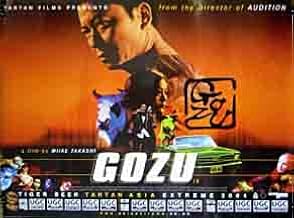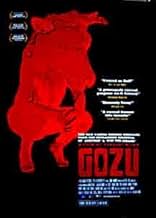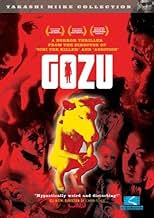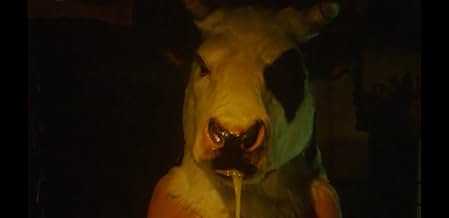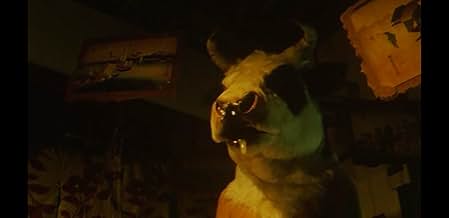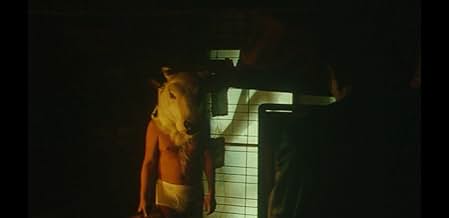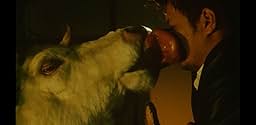VALUTAZIONE IMDb
6,9/10
13.153
LA TUA VALUTAZIONE
A un sicario della yakuza viene ordinato di guidare segretamente il viaggio dove dovrà assassinare il suo amato collega. Ma quando il collega scompare durante il viaggio, quello si trasforma... Leggi tuttoA un sicario della yakuza viene ordinato di guidare segretamente il viaggio dove dovrà assassinare il suo amato collega. Ma quando il collega scompare durante il viaggio, quello si trasforma in un'esperienza contorta, surreale e orribile.A un sicario della yakuza viene ordinato di guidare segretamente il viaggio dove dovrà assassinare il suo amato collega. Ma quando il collega scompare durante il viaggio, quello si trasforma in un'esperienza contorta, surreale e orribile.
- Regia
- Sceneggiatura
- Star
- Premi
- 5 vittorie e 4 candidature totali
Recensioni in evidenza
e seen more than half a dozen Miike flicks and GOZU is definitely he's most deviantly outrageous so far. What it all means is never clear. And yet that's exactly why the movie remains so strangely compelling. There are points where absolutely nothing makes sense and there are moments were everything magically clicks together, revealing a world of possibilities, a horrible, absurd, funny, nightmarish fabric that should be woven of crotchless panties, breastmilk and cow head masks.
GOZU's tagline should be "Beware all who enter". Even seasoned Miike fans might be put off. The first scene involving a mad yakuza beating six shades of sh#t out of a "yakuza-sniffing" dog only hints at what is to follow. Is it gonna be an outrageous crime flick in the mold of FUDOH and DOA or is there more to it? Basically the plot involves a yakuza underling driving the aforementioned mad brother in a remote town called Nagoya in order to "dispose" of him according to the boss's orders who fears his madness is getting out of hand. After doing so, he stops to grab a bite leaving the corpse in his convertible car which upon his return finds missing. The corpse, not the car.
From then on GOZU plunges headlong in a bewildering world populated by a motley crowd of the most insane characters where surrealism, mystery and dark comedy seamlessly intertwine. To what purpose? In a way, this is Miike's most Lynch-ian movie to date and not just because it's so perplexing; psychosexual abuse, perversion, identity are all key themes here. Is the main character fighting and coming to terms with his homosexuality? If ERASERHEAD is Lynch's feverish nightmare on parenthood, is GOZU its companion piece on motherhood? Right down to a finale that reminded me of Cronenberg's brand of 'body horror', GOZU is in turns exhilarating, hilarious, puzzling but above all a creative, original work. Which is more than can be said for directors with twice Miike's name and reputation.
GOZU's tagline should be "Beware all who enter". Even seasoned Miike fans might be put off. The first scene involving a mad yakuza beating six shades of sh#t out of a "yakuza-sniffing" dog only hints at what is to follow. Is it gonna be an outrageous crime flick in the mold of FUDOH and DOA or is there more to it? Basically the plot involves a yakuza underling driving the aforementioned mad brother in a remote town called Nagoya in order to "dispose" of him according to the boss's orders who fears his madness is getting out of hand. After doing so, he stops to grab a bite leaving the corpse in his convertible car which upon his return finds missing. The corpse, not the car.
From then on GOZU plunges headlong in a bewildering world populated by a motley crowd of the most insane characters where surrealism, mystery and dark comedy seamlessly intertwine. To what purpose? In a way, this is Miike's most Lynch-ian movie to date and not just because it's so perplexing; psychosexual abuse, perversion, identity are all key themes here. Is the main character fighting and coming to terms with his homosexuality? If ERASERHEAD is Lynch's feverish nightmare on parenthood, is GOZU its companion piece on motherhood? Right down to a finale that reminded me of Cronenberg's brand of 'body horror', GOZU is in turns exhilarating, hilarious, puzzling but above all a creative, original work. Which is more than can be said for directors with twice Miike's name and reputation.
i did not know anything about Miike when i saw Gozu. i read about Gozu in a magazine randomly and it sounded like something i had to see. then i waited a few weeks until it was in the theatres here. i told my fellow David Lynch fan officemate "hey, here is this movie which sounds cool, i think we both need to see this".
so we went. afterwards we left the theatre in a state of amazement. we had seen and enjoyed "weird" movies all our lives, Lynch, Cronenberg, whatever. we both enjoyed surrealism in general. even so, Gozu was really a peak experience.
but you can't just be weird for the sake of weird... is Gozu good? definitely. it is well-made, beautiful,... and it speaks to a deep visceral part at times. and then turn ridiculous and made you laugh... but even in the weirdest movies you have seen, there is probably more linearity and perhaps some symbolism you can conjure up. i think with Gozu, the way to see it is, just watch and let it take you. open your mind a little more than usual. otherwise i don't know what effect this movie can have on someone. for me, it was very significant. i immediately went and saw it again the next night (which was the last night it was playing) and my appreciation grew.
Miike is amazing. very talented director. good use of sound as well as the great visuals everyone talks about. i am looking forward to more of his work.
so we went. afterwards we left the theatre in a state of amazement. we had seen and enjoyed "weird" movies all our lives, Lynch, Cronenberg, whatever. we both enjoyed surrealism in general. even so, Gozu was really a peak experience.
but you can't just be weird for the sake of weird... is Gozu good? definitely. it is well-made, beautiful,... and it speaks to a deep visceral part at times. and then turn ridiculous and made you laugh... but even in the weirdest movies you have seen, there is probably more linearity and perhaps some symbolism you can conjure up. i think with Gozu, the way to see it is, just watch and let it take you. open your mind a little more than usual. otherwise i don't know what effect this movie can have on someone. for me, it was very significant. i immediately went and saw it again the next night (which was the last night it was playing) and my appreciation grew.
Miike is amazing. very talented director. good use of sound as well as the great visuals everyone talks about. i am looking forward to more of his work.
The reason black comedy really isn't funny anymore is because all modern black comedies just repeat the same jokes. Though Gozu isn't going to have you laughing on your first viewing, it definitely will have you laughing in shock when you look back post-viewing, after everything comes together. Gozu isn't really hard to understand, it isn't complex, but it certainly isn't forgettable. If anything, it's set up a lot like a sick version of The Wizard of Oz: a straight path, with the lead character meeting eccentric secondary characters that help him along until he reaches the final solution to his problem. While this seems simplistic, it's impossible to not notice Takashi Miike's stunning originality throughout. While most Asian horror is riddled with cliché ghosts and evil mothers, Takashi Miike proves here that he is not only the most original Asian director out there, but one of the most original directors working in the industry today. And I think Gozu may be his masterwork.
I'm personally sick of movies that claim to be a mind trip, filled with "weird" ideas that turn out to be nothing but cliché mentions of time travel and every other genetic idea. I could list names of these filmsDonnie Darko, 12 Monkeys, etc.but the point is, weird isn't weird anymore in modern cinema. If you were been born and raised on The Twilight Zone like I was, all these movies are as generic as average spy thrillers. Gozu, however, may be one few films to come out post-2000 that I can honestly call weird. And, believe me, that is a good thing. Instead of rehashing tired clichés, Gozu brings the viewer to placed they've never even thought of before. The opening instructs the viewer not to "take anything seriouslyit's all a joke", and the punch line has to be one of the most bazaar endings in cinema history. It's terrifying and genuinely grotesque, as well as hilarious. Everything in this movie is stuff writers/directors would sit around and joke about, but never, EVER, have the balls to actually film. That's what makes the story behind Gozu so refreshing and truly original. I can't believe I'm actually writing that final line in a review.
Miike's directing is stylish, as always. He knows how to set up a scene and inflict a terrifying mood. The entire film takes itself so deadpan seriously, and though that would usually be a fatal blow to most movies, Miike makes it work here. Somehow. Whenever a major plot point happens, it's done so flawlessly it's impossible not to be immersed in the moment.
So why didn't I give Gozu a perfect score? Because as much as I loved it, the movie needed to be shortened. Do not get me wrong: I love Miike's slow dialogue as much as I love his balls-to-the-wall action, but here it gets a little overbearing. Characters sit and stare at things without any purpose, and while it works, it's just not entertaining at all. The movie could have been shortened by at least 20 minutes, and if it had been, it would have been near perfection. Also, a few scenes became very repetitious and even mildly annoying. What I mean to say is, although the story is amazing, Gozu lacks a lot of entertainment value.
Overall, though, despite its flaws, Gozu is not forgettable. It's hard for me to remember a time when I would pop in a DVD and actually remember what I watched by the next morning. In a world of cheap carbon copies plots and cheesy horror elements, Gozu seems almost like perfection, even though it really isn't. But I have no room to complain. I'd take this over another black-haired-ghost-girl-evil-mother-terrorist-time-travel movie ANY DAY.
7/10
I'm personally sick of movies that claim to be a mind trip, filled with "weird" ideas that turn out to be nothing but cliché mentions of time travel and every other genetic idea. I could list names of these filmsDonnie Darko, 12 Monkeys, etc.but the point is, weird isn't weird anymore in modern cinema. If you were been born and raised on The Twilight Zone like I was, all these movies are as generic as average spy thrillers. Gozu, however, may be one few films to come out post-2000 that I can honestly call weird. And, believe me, that is a good thing. Instead of rehashing tired clichés, Gozu brings the viewer to placed they've never even thought of before. The opening instructs the viewer not to "take anything seriouslyit's all a joke", and the punch line has to be one of the most bazaar endings in cinema history. It's terrifying and genuinely grotesque, as well as hilarious. Everything in this movie is stuff writers/directors would sit around and joke about, but never, EVER, have the balls to actually film. That's what makes the story behind Gozu so refreshing and truly original. I can't believe I'm actually writing that final line in a review.
Miike's directing is stylish, as always. He knows how to set up a scene and inflict a terrifying mood. The entire film takes itself so deadpan seriously, and though that would usually be a fatal blow to most movies, Miike makes it work here. Somehow. Whenever a major plot point happens, it's done so flawlessly it's impossible not to be immersed in the moment.
So why didn't I give Gozu a perfect score? Because as much as I loved it, the movie needed to be shortened. Do not get me wrong: I love Miike's slow dialogue as much as I love his balls-to-the-wall action, but here it gets a little overbearing. Characters sit and stare at things without any purpose, and while it works, it's just not entertaining at all. The movie could have been shortened by at least 20 minutes, and if it had been, it would have been near perfection. Also, a few scenes became very repetitious and even mildly annoying. What I mean to say is, although the story is amazing, Gozu lacks a lot of entertainment value.
Overall, though, despite its flaws, Gozu is not forgettable. It's hard for me to remember a time when I would pop in a DVD and actually remember what I watched by the next morning. In a world of cheap carbon copies plots and cheesy horror elements, Gozu seems almost like perfection, even though it really isn't. But I have no room to complain. I'd take this over another black-haired-ghost-girl-evil-mother-terrorist-time-travel movie ANY DAY.
7/10
From the twisted minds of Takashi Miike and Sakichi Sato comes this atmospheric and absurd crime comedy about a Yakuza underlings' quest to find his missing colleague. To discuss the plot any further would be an exercise in cruelty to uninitiated viewers, as to watch this film without knowing what'll happen next- or without knowing anything about it at all, for that matter- is an experience like no other. It's a terrifyingly hilarious tour through the subconscious to the darkest recesses of the mind, featuring the Lynchian-Cronenbergian mix of horror and comedy that is the hallmark of Takashi Miike's best work.
Hideki Sone- now known as Yuta Sone- plays the central character, Minami. A low-level Yakuza, Sone's Minami is a perfect conduit for the audience as the film burrows into the dark and strange. He is as disturbed by the spectacle of madness that confronts him as many viewers likely will be. At times the character bears a resemblance to Anthony Perkins' K in Orson Welles' version of 'The Trial', in that everyone around him doesn't appear at all disturbed by the confusing, bizarre scenes that are occurring. Minami is the only one perturbed by the happenings in 'Gozu', and Sone's naturalistic, bewildered performance is pitch perfect for the role.
Show Aikawa plays Minami's missing colleague Ozaki, and he is brilliantly unhinged. A frequent collaborator of Miike's, Aikawa is a very versatile actor with the admirable, enviable ability to give believable, grounded performances as outrageous characters (see him in Miike's 'Dead or Alive' series for proof of this notion). Few roles he's played have been as crazy as Ozaki though, a violent, paranoid Yakuza distrustful of dogs and humans alike. Though he has relatively little screen time, Aikawa leaves a lasting impression; and 'Gozu' may be one of the most memorable movies he's made with Miike.
The rest of the cast is made up of talented performers, with Renji Ishibashi- another frequent collaborator of Miike's- and Keiko Tomita standing out, playing two sick, strange characters. Miike usually gives Ishibashi roles as creepy, twisted people; and his character in 'Gozu'- a ladle-loving sadomasochist- may be the creepiest of the lot. Tomita plays an innkeeper Minami encounters along the way who has a very weird secret and she steals her scenes completely.
Kazunari Tanaka's cinematography is unobtrusively refined and he captures the outlandishly bizarre images in the film with real panache. Sakichi Sato and Miike worked together two years before on 'Ichi the Killer,' and his script for 'Gozu' is terrifically weird and wonderfully sinister- not to mention bizarrely funny. The film doesn't take itself too seriously- though its themes are dark and deep- and his strong screenplay reflects this. Many times, while wondering what the peculiar images signify and just what the hell is going on; most will also be laughing while watching 'Gozu.'
Yes, while most will find humour alongside the macabre in 'Gozu', it is almost a certainty that some will be nothing more or less than disgusted and discouraged at the spectacle of psychological, abstract horror in the film. If you are squeamish or easily perturbed, you should probably avoid it at all costs. If you appreciate the complex, the strange and the dark, however; then 'Gozu' is the film for you.
Hideki Sone- now known as Yuta Sone- plays the central character, Minami. A low-level Yakuza, Sone's Minami is a perfect conduit for the audience as the film burrows into the dark and strange. He is as disturbed by the spectacle of madness that confronts him as many viewers likely will be. At times the character bears a resemblance to Anthony Perkins' K in Orson Welles' version of 'The Trial', in that everyone around him doesn't appear at all disturbed by the confusing, bizarre scenes that are occurring. Minami is the only one perturbed by the happenings in 'Gozu', and Sone's naturalistic, bewildered performance is pitch perfect for the role.
Show Aikawa plays Minami's missing colleague Ozaki, and he is brilliantly unhinged. A frequent collaborator of Miike's, Aikawa is a very versatile actor with the admirable, enviable ability to give believable, grounded performances as outrageous characters (see him in Miike's 'Dead or Alive' series for proof of this notion). Few roles he's played have been as crazy as Ozaki though, a violent, paranoid Yakuza distrustful of dogs and humans alike. Though he has relatively little screen time, Aikawa leaves a lasting impression; and 'Gozu' may be one of the most memorable movies he's made with Miike.
The rest of the cast is made up of talented performers, with Renji Ishibashi- another frequent collaborator of Miike's- and Keiko Tomita standing out, playing two sick, strange characters. Miike usually gives Ishibashi roles as creepy, twisted people; and his character in 'Gozu'- a ladle-loving sadomasochist- may be the creepiest of the lot. Tomita plays an innkeeper Minami encounters along the way who has a very weird secret and she steals her scenes completely.
Kazunari Tanaka's cinematography is unobtrusively refined and he captures the outlandishly bizarre images in the film with real panache. Sakichi Sato and Miike worked together two years before on 'Ichi the Killer,' and his script for 'Gozu' is terrifically weird and wonderfully sinister- not to mention bizarrely funny. The film doesn't take itself too seriously- though its themes are dark and deep- and his strong screenplay reflects this. Many times, while wondering what the peculiar images signify and just what the hell is going on; most will also be laughing while watching 'Gozu.'
Yes, while most will find humour alongside the macabre in 'Gozu', it is almost a certainty that some will be nothing more or less than disgusted and discouraged at the spectacle of psychological, abstract horror in the film. If you are squeamish or easily perturbed, you should probably avoid it at all costs. If you appreciate the complex, the strange and the dark, however; then 'Gozu' is the film for you.
Takashi Miike's stark, "Yakuza Horror Theatre" presentation Gozu (2003) is an infernal cinematic nightmare of fear and anxiety, played out within a sepia-toned subterranean underworld abstracted to the point of outright parody. Like many of the director's more personal and idiosyncratic pictures, the plot is largely secondary to the uncomfortable atmosphere and wild sense of spectacle presented on screen, as Miike constructs an absurd and enigmatic story of a loyal Yakuza henchman struggling with issues of homosexuality, guilt and desire when he is required by his boss to "dispose" of his mentally unstable brother in arms. This incredibly personal and moral dilemma - in which the central character must juggle the greater notions of loyalty to his boss and the loyalty to his best-friend and mentor-like figure that he's obviously quite attracted to - creates a rift within the world of the film that plunges the whole story into suffocating surrealism, horror and the absurd.
As with his other great masterworks, such as Audition (1999), Birds (2000), Visitor Q (2001) and The Happiness of the Katakuris (2001), Miike takes the story in so many continually contrasting and self-consciously abstract directions as to render any notion of a single interpretation entirely void. Instead, he bombards the audience with a seemingly endless barrage of repeatedly warped visions, uncomfortable scenarios and bursts of disarming black comedy to continually shock, amuse and perturb us into a sense of ultimate submission. Eventually, the point of the film becomes less important that the sub-textual ideas behind it and the surreal and over-the-top manner in which the director depicts it - with the tone of the film switching continually from the first scene to the last, as the absurdities of the Yakuza genre that Miike knows so well are persistently ripped-to-shreds and turned into fodder for this meta-physical, psycho-sexual conundrum.
With this in mind, it is best to approach Gozu as a prolonged nightmare, complete with personal demons and elements of religious imagery interweaving, as all notions of character and conventional narrative development are done away with in favour of an almost stream of consciousness presentation where the real, the dream and the purely metaphorical are smashed together and left in shards for the audience to reinterpret as they see fit. With Gozu, more so than any of his other recent pictures, Miike takes his personal style further than even the hall-of-mirrors-like surrealism of Audition; creating a dark and distorted recreation of a nameless Japanese underworld that is labyrinthine and claustrophobic throughout, whilst simultaneously jarring us back and forth with Buddhist symbolism, bizarre caricatures and a continual hum of aural, industrialised ambiance. The whole thing is further heightened by the glowing yellow sepia tones of the cinematography, merging with the occasional shards of red and blue lighting, the lingering shadows around the edges of the frame and the often distancing and exaggerated camera angles and choices of location.
With these factors in place, it would be easy to categorise Gozu as a horror film; however, this simply isn't the case. As with many of Miike's more iconic films, Gozu follows no singular genre or style; moving freely between the characteristics of illogical comedy, knock-about buddy picture, gritty Yakuza-thriller, unrequited romance and psychological horror story seemingly simultaneously. Obviously, when we take this approach into consideration, Gozu won't be the kind of film that appeals to everyone, with a certain interest and familiarity with Miike as a filmmaker required by the audience to really appreciate the sense of humour and the continual shifts in tone. Even then, multiple viewing will be needed for the audience to fully digest the film's central message and layers of potential interpretation. However, it's definitely worth it, especially for anyone with a keen interest in the work of similarly minded filmmakers like David Lynch, Terry Gilliam, Sogo Ishii, Ken Russell, David Cronenberg and Shinya Tsukamoto.
Gozu takes the surreal horror and ambient farce of films like The Happiness of the Katakuris and Visitor Q to the next conceivable level of cinematic deconstruction, self-reference and meta-textual despair; as we literally submerge ourselves in a homosexual love story played out against a self-aware purgatory-like construction, rife with the allusions to the filmmakers aforementioned, and further applied alongside the desolate use of landscapes, jarring shifts from parody to horror and the freewheeling structure of the narrative itself. Combined with the fine performances from Hideki Sone, Kimika Yoshino, Tetsurô Tamba and Miike regulars Sho Aikawa and Renji Ishibashi, Gozu is easily one of its directors best and most unique endeavours; an arch, dead-pan, deranged and often dangerous sub-textual trawl through one man's despair and Freudian confusion dressed up as a post-apocalyptic fable of ridiculous gangster theatrics, role playing, gender metamorphosis and pure, existentialist angst.
As with his other great masterworks, such as Audition (1999), Birds (2000), Visitor Q (2001) and The Happiness of the Katakuris (2001), Miike takes the story in so many continually contrasting and self-consciously abstract directions as to render any notion of a single interpretation entirely void. Instead, he bombards the audience with a seemingly endless barrage of repeatedly warped visions, uncomfortable scenarios and bursts of disarming black comedy to continually shock, amuse and perturb us into a sense of ultimate submission. Eventually, the point of the film becomes less important that the sub-textual ideas behind it and the surreal and over-the-top manner in which the director depicts it - with the tone of the film switching continually from the first scene to the last, as the absurdities of the Yakuza genre that Miike knows so well are persistently ripped-to-shreds and turned into fodder for this meta-physical, psycho-sexual conundrum.
With this in mind, it is best to approach Gozu as a prolonged nightmare, complete with personal demons and elements of religious imagery interweaving, as all notions of character and conventional narrative development are done away with in favour of an almost stream of consciousness presentation where the real, the dream and the purely metaphorical are smashed together and left in shards for the audience to reinterpret as they see fit. With Gozu, more so than any of his other recent pictures, Miike takes his personal style further than even the hall-of-mirrors-like surrealism of Audition; creating a dark and distorted recreation of a nameless Japanese underworld that is labyrinthine and claustrophobic throughout, whilst simultaneously jarring us back and forth with Buddhist symbolism, bizarre caricatures and a continual hum of aural, industrialised ambiance. The whole thing is further heightened by the glowing yellow sepia tones of the cinematography, merging with the occasional shards of red and blue lighting, the lingering shadows around the edges of the frame and the often distancing and exaggerated camera angles and choices of location.
With these factors in place, it would be easy to categorise Gozu as a horror film; however, this simply isn't the case. As with many of Miike's more iconic films, Gozu follows no singular genre or style; moving freely between the characteristics of illogical comedy, knock-about buddy picture, gritty Yakuza-thriller, unrequited romance and psychological horror story seemingly simultaneously. Obviously, when we take this approach into consideration, Gozu won't be the kind of film that appeals to everyone, with a certain interest and familiarity with Miike as a filmmaker required by the audience to really appreciate the sense of humour and the continual shifts in tone. Even then, multiple viewing will be needed for the audience to fully digest the film's central message and layers of potential interpretation. However, it's definitely worth it, especially for anyone with a keen interest in the work of similarly minded filmmakers like David Lynch, Terry Gilliam, Sogo Ishii, Ken Russell, David Cronenberg and Shinya Tsukamoto.
Gozu takes the surreal horror and ambient farce of films like The Happiness of the Katakuris and Visitor Q to the next conceivable level of cinematic deconstruction, self-reference and meta-textual despair; as we literally submerge ourselves in a homosexual love story played out against a self-aware purgatory-like construction, rife with the allusions to the filmmakers aforementioned, and further applied alongside the desolate use of landscapes, jarring shifts from parody to horror and the freewheeling structure of the narrative itself. Combined with the fine performances from Hideki Sone, Kimika Yoshino, Tetsurô Tamba and Miike regulars Sho Aikawa and Renji Ishibashi, Gozu is easily one of its directors best and most unique endeavours; an arch, dead-pan, deranged and often dangerous sub-textual trawl through one man's despair and Freudian confusion dressed up as a post-apocalyptic fable of ridiculous gangster theatrics, role playing, gender metamorphosis and pure, existentialist angst.
Lo sapevi?
- QuizThe store-owner's American wife knew no Japanese, and had to read her lines phonetically off cue cards posted above her head. She proved to be absolutely hopeless at anything resembling proper pronunciation or competent acting. Director Takashi Miike found the result interesting and displayed the cards for a simultaneously eerie and comedic effect.
- ConnessioniFeatured in Horror's Greatest: Japanese Horror (2024)
I più visti
Accedi per valutare e creare un elenco di titoli salvati per ottenere consigli personalizzati
Dettagli
- Data di uscita
- Paese di origine
- Sito ufficiale
- Lingua
- Celebre anche come
- Yakuza Horror Theater: Gozu
- Luoghi delle riprese
- Aziende produttrici
- Vedi altri crediti dell’azienda su IMDbPro
Botteghino
- Lordo Stati Uniti e Canada
- 58.202 USD
- Fine settimana di apertura Stati Uniti e Canada
- 5030 USD
- 1 ago 2004
- Lordo in tutto il mondo
- 58.633 USD
Contribuisci a questa pagina
Suggerisci una modifica o aggiungi i contenuti mancanti



